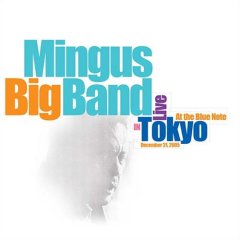
Written by Fumo Verde
All right, if you read the review I did on Charles Mingus, Live at UCLA, then you are familiar with the style that Mr. Mingus is all about. The style of non-conformity, improv and the like, sounds that feel jumbled, but what if those sounds put down could be practiced and rehearsed again and again? Well, this is where the Mingus Big Band (MBB) comes alive, and here at the Blue Note in Tokyo they laid down some of those tracks. Produced by Sue Mingus and recorded by engineer Kichi Goto, they have brought to us the incredible sounds of Charles Mingus.
To catch the magic that Mingus tried to capture and the feeling of what his music is all about, the MBB increased the size and sound of the usual octet. The musicians includes three trumpets, two alto saxophones, two tenor saxophones, a baritone saxophone, two trombones, a bass trombone, a tuba, a piano, a flute, a stand-up bass, and drums. Put all this together and you get the start of what Mr. Mingus was trying to get at.
As said once before, music composed by Mingus is hard for the musician to play as well hard for some listeners to clutch and ear for. This CD grabs a live show that lets everyone take in the pieces put together by Mingus. Not just the obscure and existential notes that sometimes lunge out at you or whiz by you like a passing car. Here the MBB delicately tames the wild beasts that are so often the sounds of Mingus.
"Wham Bam" leads off the set, and it's something about a brass section that gets you moving. The full force of all that brass knocks you back into your seat as the drums, bass and piano zing you for loops and dips. The horns rage up and down the scales at break-neck speeds, while the piano scurries about, chasing the drums and bass as they control the tempo, keeping that pace until the tune is done. "Opus Four" follows and has a slower drive to it, at least when it starts out. With drums banging away and cymbals crashing, the horns fill in the segments that at first sound like something out of "West Side Story". As the jam hums along, it takes time to slow down for certain horns to make their solo shots, each one trying to top the other. You can tell the band in having fun with this, and although there is a chance for improv, the architecture that holds up the music can be followed by even the average listener who maybe brand new to Charles Mingus. As with "Wham Bam", "Opus Four" gives the audience a ride of their lives.
"Celia" has a mellower tone to it. Although this piece has a softer beat, the brass section retains the power and passion to knock your socks off. Passion is what drove Charles Mingus, and it is what drives the MBB to charge the music with a no-fear attitude. "Bird Calls" starts out with the band members making bird sounds, cheeping and cawing. They keep this up as the horns reflect the noises that the band is making. Then the chase is on. Whether this is dedicated to Charlie Parker, it didn't say in the liner notes, but it has Bird's style to it, of which Mingus would extract out from time to time, being a big fan of the Bird himself.
Mingus loved to mix sounds and styles just to see what would come out of it. This design of playing isn't lost on the MBB, for they have the talent and the ability to push such techniques to the limit, just as he would have. There are a total of eight jams on this disk, and each one sounds better than the last. This isn't a tribute album or even a tribute to Mingus. These are musicians who love his compositions and are addicted to playing what he has created, and they play it well. For anyone with a taste for jazz, and epically a taste for Mingus, the MBB “Live in Tokyo” is a great addition for the collection. It gives one a chance to hear the easier pieces that Mingus has come up with.... and nothing he ever did was easy.
This CD though, gives everyone a chance to hear and feel the power and energy and the genius that Mingus was, and even since his passing in 1979, the Mingus experience can be felt through his music. One of the best ways to feel that power is right here from the MBB. A great appreciation for those who attempt to charge after the musical dream that Mingus had, and the MBB makes it sound easy. I wonder what he would say? I think he would be happy because this CD brings his art to life, and for Mingus that was what making music was all about.